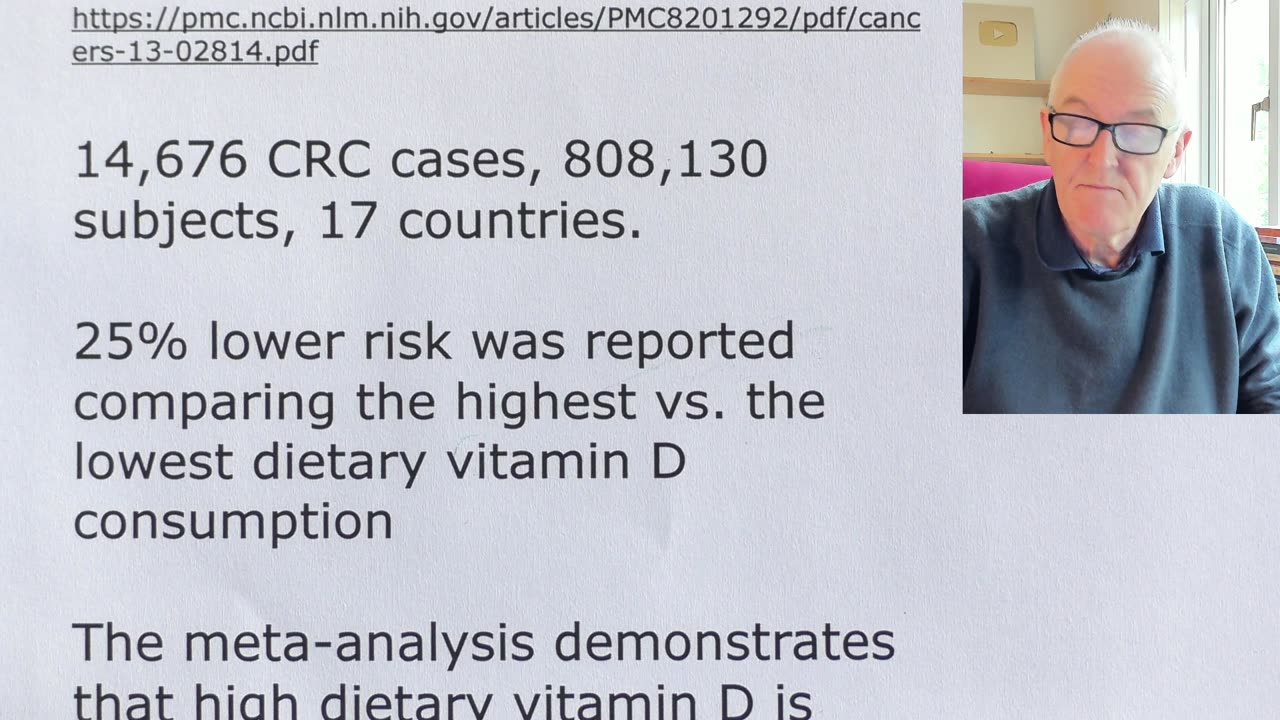Premium Only Content

Young cancer increases confirmed
Colorectal Cancer Incidence in US Adults After Recommendations for Earlier Screening
After a stable 15-year trend, local-stage CRC incidence increased steeply in adults aged 45 to 49 years during 2019-2022,
including a 50% relative increase between 2021 and 2022.
Sudden uptick in incidence among adults aged 45 to 49 years in 2021,
the increase accelerated in 2022
Individuals aged 45 to 49 years
(Local stage tumours, colorectal cancers)
2004-2019
An increase of 1.1% annually
2019-2022
Accelerated to 12.0% annually
In 2019
9.4 per 100 000
In 2021
11.7 per 100 000 in 2021 (25% relative increase)
In 2022
17.5 per 100 000 (a 50% increase relative to 2021)
https://colorectalcancer.org/article/acs-releases-colorectal-cancer-estimates-2024
Colorectal cancer is common and deadly
152,810 new cases of colorectal cancer in 2024.
Of these, 106,590 colon cancer, and 46,220 rectal cancer.
CRC is the second leading cause of all cancer-related deaths in the U.S.
Estimated 53,010 deaths in 2024
Estimated 52,550 deaths in 2023
Rising CRC cases among younger people
Mortality rate in young people is also increasing
Now leading cause of cancer death in men under 50,
second leading cause in women under 50
Young people are often diagnosed with more advanced cancers due to delays in detection.
JAMA
… likely reflects diagnosis of prevalent asymptomatic cancer through first-time screening due to recommendations for adults to begin screening at age 45 years instead of 50 years.
The sudden uptick in incidence among adults aged 45 to 49 years in 2021 may reflect a rebound of missed diagnoses in 2020 because of pandemic-related disruptions.
However, the increase was unique to early-stage disease in the newly eligible screening age group and accelerated in 2022, and USPSTF recommendations did not change until 2021.
Although additional data years are needed for confirmation, the recent uptick in localized CRC after recommendations to initiate screening in adults aged 45 to 49 years is promising and may reflect earlier detection through screening initiation.
JAMA Data obtained
From 21 registries
US national cancer institute
Cases diagnosed from 2004 to 2022
Among adults aged 20 to 54 years
N = 219, 373 cancer cases
Colorectal cancer screening age
Down to 50 years in UK (2024 - 2025)
Down to 45 years in US (2018 - 2021)
https://www.nhs.uk/tests-and-treatments/bowel-cancer-screening/
Faecal immunochemical test for blood (FOB)
Interesting vitamin D study
https://pmc.ncbi.nlm.nih.gov/articles/PMC8201292/pdf/cancers-13-02814.pdf
14,676 CRC cases, 808,130 subjects, 17 countries.
25% lower risk was reported comparing the highest vs. the lowest dietary vitamin D consumption
The meta-analysis demonstrates that high dietary vitamin D is associated to CRC prevention.
Signs of CRC
RP blood or blood on / faeces
Change in normal bowel habit
Feeling of incomplete emptying or needing to strain after passing
Pain in back passage or abdomen
Anaemia
Weight loss
Masses
Risk factors
https://www.cancerresearchuk.org/about-cancer/bowel-cancer/risks-causes
Diet
Eating too much processed meat and red meat
(13% of cases in UK are linked to eating processed meats)
All sorts of fibre are good
Overweight / obese
(11% linked in the UK)
Physical activity
Smoking tobacco
(7% linked in the in the UK)
Alcohol
(6% linked in the UK)
Age
Family history
Some specific traits such as Lynch syndrome, hereditary non polyposis colon cancer (HNPCC).
Cancer Research UK
Can’t find anything about mRNA vaccine or vitamin D
-
 27:50
27:50
Dr. John Campbell
1 month agoVaccine injuries, full version
18K70 -
 UPCOMING
UPCOMING
FreshandFit
4 hours agoAfter Hours w/ Tommy Sotomayor
3.43K2 -
 1:27:57
1:27:57
Tucker Carlson
1 hour agoTucker and Col. MacGregor Warn How Neocons Are Exploiting the Drug Crisis to Drag America Into War
6616 -
 LIVE
LIVE
Badlands Media
6 hours agoDevolution Power Hour Ep. 402
7,899 watching -
 LIVE
LIVE
Inverted World Live
5 hours agoUFO Seen Over Tokyo During Trump Visit | Ep. 132
3,684 watching -
 2:54:08
2:54:08
TimcastIRL
3 hours agoDemocrat FEDERALLY INDICTED For Obstructing ICE Agents In Chicago | Timcast IRL
160K72 -
 LIVE
LIVE
SpartakusLIVE
5 hours agoNEW - REDSEC Battle Royale || The Duke of Nuke CONQUERS ALL
333 watching -
 LIVE
LIVE
PandaSub2000
1 day agoLIVE 10:30pm ET | NINTENDO DS Night
138 watching -
 LIVE
LIVE
Alex Zedra
2 hours agoLIVE! Battlefield RecSec
267 watching -
 1:26:50
1:26:50
The Quartering
3 hours agoErika Kirk Threatened, SNAP Riots Near, & New AstroTurfed Woke Lib Influencer
19.6K14